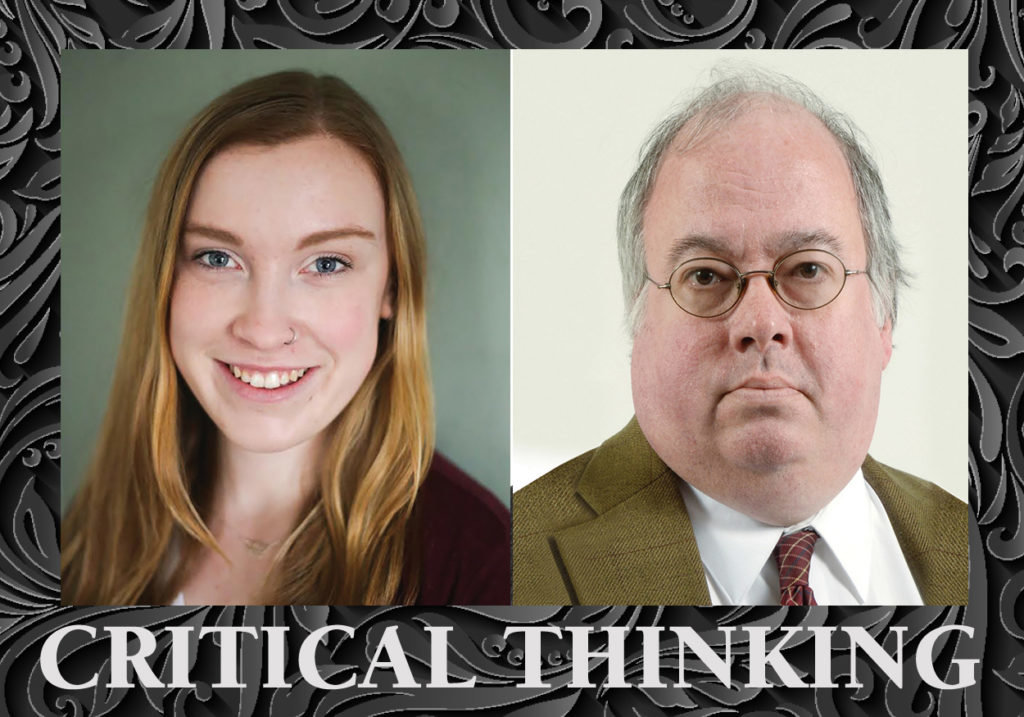
Recently, the New York Times published an anonymous op-ed from a high-ranking government official. If a government official approached you to publish an anonymous op-ed on a local or national level, would you? Why or why not?
 Julie Pike, 21, senior, University of Southern Maine (Portland, Maine)
Julie Pike, 21, senior, University of Southern Maine (Portland, Maine)
Pike is a communications major and editor-in-chief of the Free Press, the student-run newspaper of USM.
It’s a leap of faith for an editor of a newspaper to quote an anonymous source in an article. It’s an even bigger leap for an editor to publish an op-ed by an anonymous writer.
When it’s a news article, readers are given other sources and context to provide credibility to the story. In the case of an anonymous op-ed, such as the one in the New York Times, readers can’t be sure of whom to trust if they have only an anonymous writer to rely on.
Do they trust the anonymous source who claims to be a high-ranking government official? Do they believe the editor, who knows the identity of the source, to publish stories by credible people?
In this tough ethical situation, an editor needs to consider the motivation of an anonymous writer. Ask the questions: Why does this person need to be anonymous? What kind of response are they hoping to get? Is it essential for our readers to know this? Is it worth it to risk our readers’ trust to publish this?
There won’t be many situations where the answer to that last question is yes.
While the anonymous op-ed in the New York Times did certainly spark a reaction from the public and the White House, I question whether it’s going to cause any true change in how Americans feel about the future of their country.
It can be assumed that this writer believes they are “doing what is best for their country,” and they want to inform the public without losing their job. However, they could have continued along with their efforts without going public.
Since the writing in question is a personal opinion, the author should be confident enough to put their name on it. Otherwise, their opinion means nothing, and is not worth publishing.
As an editor of my college newspaper, I want anyone willing to share their opinions to be prepared to stand their ground. If they fear they may lose their job in response, then it’s not the best idea to publish a piece of personal writing to the public.
 Rich Jackson, 52, executive editor, Times-News, Burlington, N.C.
Rich Jackson, 52, executive editor, Times-News, Burlington, N.C.
Jackson has been executive editor of the Times-News since 2017. Prior to that, he was editor of the Derrick and the News-Herald in Oil City, Pa.
I would not have run the anonymous op-ed the New York Times printed about a group in the White House protecting the country from Donald Trump.
It’s bad for the country. It feeds into a misleading Trump narrative. It’s bad for journalism as a whole. But mostly, it’s horrible for the New York Times. (Full disclosure: I love the Sunday New York Times so much my daughter has referred to it as “Dad’s Girlfriend” since she was 10 years old.)
The op-ed is bad for the country because it creates more problems than it solves—all of it coming simply from “someone known to the Times.” If we have a secret cabal of unelected people running the country, the Times should have investigated that story rather than printing the screed.
The piece also further feeds the claim that any critical stories of the president are “fake news” because no names are attached. That calls into question the hard work of newspapers like mine, where we are daily accused of “fake news” even though we don’t use anonymous sources and every empirical fact can be verified independently by our readers.
But the greatest damage, I’m afraid, is to the Times has set itself up for an unfortunate conundrum.
I recently read a story told in “The Secret Man” by Bob Woodward about Mark Felt (Deep Throat), the most famous anonymous source of all. Woodward’s colleague at the Washington Post, Richard Cohen, was about to write a column naming Felt as Deep Throat in the late 1970s. But Woodward lied to Cohen, his trusted friend, and told Cohen Felt wasn’t Deep Throat. In doing that, he broke what I would consider a sacred bond.
Consider what’s happening now in Washington. For awhile, the hottest story in our nation’s capital was who wrote the anonymous op-ed. We must imagine the Times still has reporters on this so as not to be scooped on its own story.
Now we get to the conundrum: When—not if—a Times reporter finds out who wrote it, will the Times break the confidence of the editorial page or spike the news?
Comments
No comments on this item Please log in to comment by clicking here